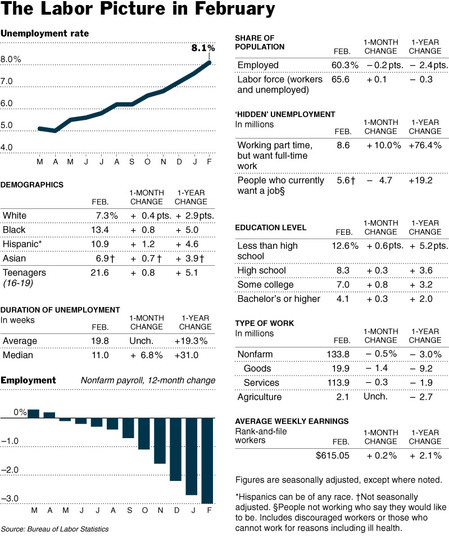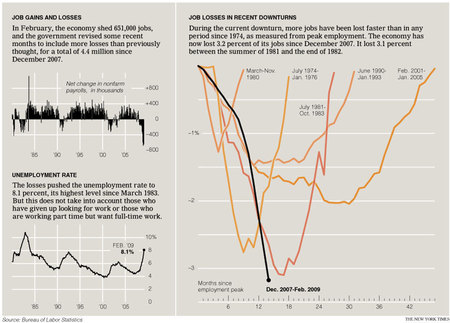Was the Obama stimulus plan built to solve a recession where unemployment peaked at 8.1 percent ? Now that unemployment has hit 8.1 %, should the $787 billion stimulus package be revised and embiggened ?

Fall in US household wealth likely to spur a long recession
By Martin Feldstein
Tuesday, Mar 03, 2009, Page 9
The massive downturn in the US economy will last longer and be more damaging than previous recessions because it is driven by an unprecedented loss of household wealth. Although the fiscal stimulus package that US President Barack Obama recently signed will give a temporary boost to activity sometime this summer, the common forecast that a sustained recovery will begin in the second half of the year will almost certainly prove to be overly optimistic.
Previous recessions were often characterized by excess inventory accumulation and over-investment in business equipment. The economy could bounce back as those excesses were absorbed over time, making room for new investment. Those recoveries were also helped by interest rate reductions by the central bank.
This time, however, the fall in share prices and in home values has destroyed more than US$12 trillion of household wealth in the US, an amount equal to more than 75 percent of GDP. Previous reactions to declines in household wealth indicate that such a fall will cut consumer spending by about US$500 billion every year until the wealth is restored. While a higher household saving rate will help to rebuild wealth, it would take more than a decade of relatively high saving rates to restore what was lost.
The decline in housing construction has added to the current shortfall in aggregate demand. The annual number of housing starts has fallen by 1.2 million units, cutting annual GDP by an additional US$250 billion. While this will eventually turn around as the inventory of unsold homes shrinks, the recovery will be slow.
So the US economy faces a US$750 billion shortfall of demand. Moreover, the usual automatic stabilizers of unemployment benefits and reduced income tax collections will do nothing to offset this fall in demand, because it is not caused by lower earnings or increased unemployment.
Although the recently enacted two-year stimulus package includes a total of US$800 billion of tax reductions and increased government spending, it would be wrong to think that this will add anything close to US$400 billion a year to GDP in each of the next two years. Most of the tax reductions will be saved by households, rather than used to finance additional spending.
Moreover, a substantial part of the spending will be spread over the following decade. And some of the government spending in the stimulus package will replace other outlays that would have occurred anyway. An optimistic estimate of the direct increase in annual demand from the stimulus package is about US$300 billion in each of the next two years.
The stimulus package would thus fill less than half of the hole in GDP caused by the decline in household wealth and housing construction, with the remaining demand shortfall of US$450 billion in each of the next two years causing serious second-round effects. As demand falls, businesses will reduce production, leading to lower employment and incomes, which in turn will lead to further cuts in consumer spending.
To be sure, an improvement in the currently dysfunctional financial system will allow banks and other financial institutions to start lending to borrowers who want to spend but cannot get credit today. This will help, but it is unlikely to be enough to achieve positive GDP growth.
A second fiscal stimulus package is therefore likely. However, it will need to be much better targeted at increasing demand in order to avoid adding more to the national debt than the rise in domestic spending. Similarly, the tax changes in such a stimulus package should provide incentives to increase spending by households and businesses.

BUSINESS / ECONOMY
Job Losses Hint at Vast Remaking of U.S. Economy
By PETER S. GOODMAN and JACK HEALY
Published: March 7, 2009
With unemployment at 8.1 percent, some economists believe that a wrenching restructuring is under way.


